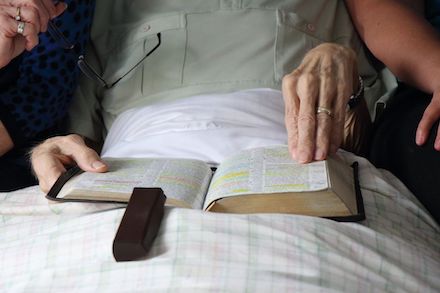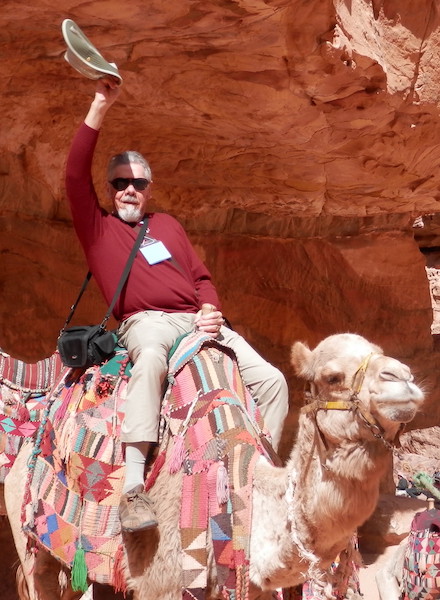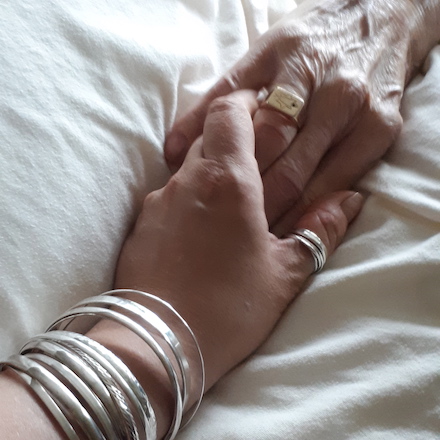
|
|
|
|
|
| Issue 20X: | 21 Nov. 2023 |
| CNF: | 2,245 words |
By Lorette C. Luzajic
Patience, and Other Virtues That I Lack
A story I have told before: how, when my father was dying, he prayed patiently each morning, asking for fifteen more years.
In a much older story, the prophet Hezekiah had been granted a miraculous recovery and promised another fifteen years.
I do not have my father’s grace, and I got increasingly bitter over these unheard prayers as he grew weaker and thinner by the day. He continued his requests faithfully at morning prayers, but never raged about the obvious. I felt inclined to point out what it seemed to me that Daddy had failed to notice. “Guess God isn’t answering your prayers,” I seethed.
My father was of exactly the average age of longevity, on schedule to go down neither unusually young nor surprisingly old. But he had been, as they say, healthy as a horse up until the day the cancer started on his kidneys. It was an injustice to me that the man I loved could disintegrate so quickly. It was impossible to accept that my father could turn to dust, just like that, just like everybody else.
“God DID answer my prayers,” Dad corrected me. “And the answer is evidently no.”
In the face of this rejection and betrayal from on high, I could not possibly be grateful. But thanksgiving for each wretched day of pain and demise was a daily practice of my father’s. I did not know how he could so easily accept being robbed of his years, but he assured me that he had all of the days that were ordained for him, neither more nor less, quoting the Psalms. (“Your eyes saw my unformed body; all the days ordained for me were written in your book before one of them came to be” Psalms 139:16, Holy Bible, NIV.)

Dad in hospice, 2018*
Dad also reminded me, gently, that it was God who gave him life, but the cancer taking his life away was from somewhere else, whether self or “The Man” or nature, impossible to know. He continued to give thanks for each of his remaining days. Although I railed against the cruelty of the heavens for allowing this illness to erode him, Dad said I may as well rage against the sun and the wind and the rain, all necessary parts of life, like death. He said the trick was seeing the days that we had, not the ones we didn’t have.
This is what I was thinking about as I got off the elevator a few weeks ago at Princess Margaret Hospital, following the arrows to the “Survivorship Wing.” Just as prone to bristling and outrage as my father was clement, I had especially railed against this particular doctor’s visit. I was resentful going to an appointment in a program of this name. I hated the very idea of “survivorship.” When my father had finally closed his eyes for good in that little hospice, neither of us knew I would be sick, too, in just a few years. Maybe I already was. And fast forward through reel after reel of living hell, toxic infusions, burning radiation, exhaustion, pain, bleeding, needles, knives, and all of this after several other debilitating disasters to my legs that eluded diagnosis—somehow, on the other side of that, I was still standing. What had been denied my father was granted to me, and I didn’t even ask for it. Maybe it wouldn’t be 15 years. Maybe it would be longer. But here I was.
I wasn’t entirely sure why I loathed the idea of “being a survivor” so much, when clearly the alternative was much worse. It felt like a booby prize somehow. Perhaps it felt like an affront to all those who didn’t survive. When I got cancer, I asked, “why me?” until I learned that one in eight women get breast cancer and some get two or more different kinds of breast cancer at the same time. When I survived it, I asked “why me?” again.
Part of it, too, was pure trauma. Survivorship meant that I had cancer in the first place, a shock I was still reeling from. I was still in denial.
Another part of it was that I was already a survivor, and it was a badge I had never worn proudly, maybe for the same reasons. Many years ago, in “my past life” as I like to say, I had a very serious addiction problem. Although I sometimes write rather candidly about it, on some level I can barely take the pain that still floats into the present from that chaos and darkness. On some level, too, I feel guilty. Many loved ones from this era did not get or stay clean, or they died. It didn’t feel right to wave a victory flag when I was just lucky. Then, as now.
The survivorship clinic is all about the side effects and diseases you get from treatment, if you lived through the cancer. I have lymphedema and fibrosis from the radiation, chronic conditions that I need to learn to manage. I was and am furious. How can it be that the only medicine they’ve come up with to treat cancer causes severe damage to the body? How could they not have warned me in advance? I left the clinic raging that the side effect had been described as “a little swelling.” They’d left out the fact that it is painful, lifelong, progressive, and disfiguring, not to mention expensive. Recommended treatment to control it would be out of pocket, and necessary for the rest of my life.
Perhaps it is ironic that my depression over the cancer began after everything. When I woke up from the surgery, I felt deep inside of me that the rest of the poison had been removed from my body. I knew I was in remission then, even before they told me. That’s when I started to grieve. I got more and more angry, and more and more sad. I felt that terrible weight of being a burden; apologized to my beloved for being ugly and bald and fattened like a holiday turkey by the steroids.
I have always wanted to be light as air, nimble, yogic. But I have always been heavy, intense, a cloud of drama and chaos and a vortex of need. Flashes of having to be helped on crutches to the bathroom in the night made me feel sicker than all the rest of it had. My partner gave me life-saving home needles that I was incapable of giving myself. I couldn’t bear the memory of it after the fact. They were necessary medicine, to prevent blood clots and to help my immune cells knit back together. There were times I called out in agony when he administered them, and still he did what needed to be done and didn’t leave me. Now I felt so guilty about my cowardice that I couldn’t stand it.
Is this stuff what they mean when they say survivor’s guilt?
Things in the course of this journey took a different turn when I began lymphatic drainage treatments. The therapist’s expensive and skilled hands were a relief, but I found it hard to relax because I was so angry about going in the first place. I didn’t see any obvious improvements and resented more time, more appointments, more money, more need. She was very professional and not very talkative, and that suited me fine. But after a few sessions, strange things started to happen in that little clinic. Sometimes I just started laughing in the middle of the treatment. Sometimes I started crying. It would come out of nowhere, a fountain of release from so much pain.
One day I began chattering and a torrent of despair and anger streamed out. Angie didn’t say anything at first, just went about her therapy and listened. I told her that I felt poisoned and burned. I told her it made my skin crawl when people said “it’s only hair”—because it was something that was robbed from me. It was violating. I told her how the chemo ward was like a barnyard, with a herd of sick people waiting hours and hours to be injected with toxins that would give us heart disease, neuropathy, more cancer, and make us so vulnerable to infections that we could die from a cold. And I said that though we had been warned about lymphedema, we were so snowed under by brochures and side-effect lists that there was no real connecting the dots about the horrors of a permanently damaged lymphatic system.
I went on and on until I was absolutely emptied of everything.
That’s when Angie said, “I’m going to tell you a story.” She told me about a woman who had lymphedema, not from the radiation but from the cancer tumor itself. She didn’t want radiation because her sister had lymphedema from it, but she herself got lymphedema anyways, from the disease.
“Oh, gosh, that’s terrible,” I said. “Did you help her?”
“She died,” Angie said abruptly.
I had spilled everything inside of me, and didn’t have any of my usual prickly defenses in place. All of my resistance and defiance came crumbling down in that pivotal moment.
Angie continued, “If you were afraid of lymphedema, you might have made the wrong decision. Thanks be to God, because it is the side effect of staying alive.”
You never know how and when you will come face to face with your demons. Or your angels.
In a different situation, I might have grown defensive and irate. But I felt the love and the hard truth. When Angie said she could see that I was in a hurry to get my life back and resume where I had left off, it was exactly that way. And the unspoken reality in the air was something else, of course. There was no going back or getting it back. My mind and body would not ever be the same. They could not be.
Angie told me that I had been through more than I even knew. That it was normal and common to have these feelings and moods, because I was coming out of the shock of an unbelievable trauma.
I realized that I was, in fact, that thing I hated and didn’t want to be: a survivor.
It’s not that we don’t want to survive. It’s that we want to not have had the thing. The illness, the trauma, the addiction, whatever the thing is. The harsh reality is profoundly disturbing and difficult to accept.
But how could I come to terms with the new normal, I wondered. Angie urged me gently to try practicing patience. Though I hope I have a few inspiring qualities, patience is not one of them! Angie told me that you simply cannot recover from cancer in two months. Not the body, not the soul.
I understood instantly that the only way there was through acceptance. It was time for me to start accepting all the things I had been through and giving them the space they required. Acceptance is not an instant achievement like a scratch-and-win lottery ticket. It’s something I would have to practice. And it could only begin in gratitude, for each breath.
My father did not have the same struggle to accept things, even with the fact that his wishes were not granted. He had always been calm and gentle. He was a great teacher to me. I am by nature a tempest. I inherited his joy of foolishness—we are both pranksters and hams. But I did not inherit his humility and calm. We each have our own strengths and weaknesses to contend with. It’s part of the maze and the mystery of our journey.

Dad on camel in Petra, 2015*
I know barely anything about Angie, but I know she has the same kind of courage and peace that my father had, and I was in the right place at the right time to hear it.
Everything changed that afternoon. Since then, whenever the rage wells up inside of me, or even worse, that unfulfillable longing to be able to walk carefree or have a day without pain, I become mindful of how it is a distraction, and center myself as best I can in gratitude. It’s like coming back to your breath when your mind wanders during yoga.
I don’t know how to face the truth that there is so much pain and sorrow in the world, so much suffering and disease. When I asked my Dad once why he wasn’t more angry about getting sick, he asked me, “Why should I be exempt from a disease that one in two people get? I am thankful for every day I was given.”
And my many gifts! The father I had, and the friends. The second chances, pure grace, or chance, however you look at it, but nothing I did. I’m just beginning to understand these gifts, even of the losses, because it is love that you had. Perhaps you cannot understand these things without being brushed by death. Perhaps even the terrifying warning that some of us get, of the inevitable outcome, is gravy. I am just waking up now to all of it. That we are all survivors, if we are still here. I’m still learning. And I am thankful.

Dad and Lorette, hand in hand, 2018*
*Photographs above are copyrighted by Lorette C. Luzajic, all rights reserved, and appear here with her permission.
Lorette C. Luzajic
reads, writes, publishes, edits, and teaches flash fiction and prose poetry. Her own fiction and prose poems have appeared in Ghost Parachute, The Disappointed Housewife, Bending Genres, Unbroken, Trampset, The Citron Review, Flash Boulevard, New Flash Fiction Review, and beyond. Her works have been nominated for Best of the Net, the Pushcart, Best Microfiction, and The Best Small Fictions. She won first place in a flash contest at MacQueen’s Quinterly. The author of two collections of small fictions, Pretty Time Machine and Winter in June, she has also acted as judge for the Tom Park Poetry Prize.
Lorette is the founding editor of The Ekphrastic Review, a journal devoted to literature inspired by visual art. Her journal’s first print anthology, The Memory Palace, which she is co-editing with Clare MacQueen, is forthcoming in Spring 2024.
In addition, Lorette is an award-winning neoexpressionist artist who works with collage and mixed media to create urban, abstract, pop, and surreal works. She has collectors in thirty countries so far. She is also passionately curious about art history, folk horror, ancient civilizations, artisan and tribal jewelry, and culinary lore, to name a few.
Visit her at: www.mixedupmedia.ca
More on the Web: By, About, and Beyond
⚡ Two Must-Read Books by The Queen of Ekphrasis, commentary in MacQ-9 (August 2021) by Clare MacQueen, with links to additional resources
⚡ Featured Author: Lorette C. Luzajic at Blue Heron Review, with two of her prose poems (“Disappoint” and “The Piano Man”); plus “Poet as Pilgrim,” a review of Pretty Time Machine by Mary McCarthy (March 2020)
⚡ Fresh Strawberries, an ekphrastic prose poem in KYSO Flash (Issue 11, Spring 2019), nominated for Best of the Net and the Pushcart Prize
| Copyright © 2019-2026 by MacQueen’s Quinterly and by those whose works appear here. | |
| Logo and website designed and built by Clare MacQueen; copyrighted © 2019-2026. | |
|
Data collection, storage, assimilation, or interpretation of this publication, in whole or in part, for the purpose of AI training are expressly forbidden, no exceptions. |
At MacQ, we take your privacy seriously. We do not collect, sell, rent, or exchange your name and email address, or any other information about you, to third parties for marketing purposes. When you contact us, we will use your name and email address only in order to respond to your questions, comments, etc.